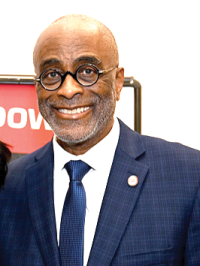February 22, 2024

As we continue into 2024 – a year that marks the 50th anniversary of the desegregation of public schools in the city through busing – Boston has a unique opportunity to be a leader in embracing an issue that cities and states across the country are reckoning with.
Known for being the birthplace of the American revolution, the city must seize this opportunity to be the birthplace of another kind of revolution, one that will address and repair the deep-rooted history of forced enslavement and systematic oppression through reparations.
With Massachusetts having been the first colony to legalize slavery, it’s impossible to deny the legacy of slavery woven into the fabric of Boston’s history. Beyond the physical history, unjust laws and policies were established by city, state, and federal government in the years following abolition that created the systematic oppression that reverberates throughout Boston today.
Redlining, race-based deed restrictions, discriminatory housing policies, segregation, and the war on crime and drugs are just a few of the many policies that directly led to the staggering disparities in wealth, career and education opportunities, health, and overall experiences across race in our city.
Our communities are long past due for the acknowledgement and repair of the great harms that came out of individuals, institutions, corporations, businesses, and the City of Boston’s role in the slave trade and its legacy.
Many tend to associate reparations with the assignment of blame, an impractical focus on the past, and unfair or unjustified benefits. These notions are misguided and simply untrue – because the intergenerational effects of slavery and the discriminatory policies that followed still have tangible effects on the Black community today. Reparations presents an opportunity to not only acknowledge historical wrongdoings, but also to actively heal and reconcile the harms of systemic racism. Now is an especially critical time.
As Boston becomes increasingly unaffordable amid a housing crisis, residents whose ancestors laid the foundations for this city are among the first to be pushed out. Reparations can take many forms – financial compensation, new housing programs, and investment in education and businesses are just a few – and a key part of the city’s Reparations Task Force’s process will be defining what reparations can mean for Boston through community feedback and rigorous historical and topical research.
The recently selected research teams are Boston-based, qualified experts with demonstrated commitments to restorative truth and community engagement in their work. At the Task Force’s most recent public meeting, the room was charged with the community’s excitement, emotion, and energy for the progress of this work.
Importantly, reparations is neither a zero-sum game nor is it the point of reparations to make anyone “pay” for the sins of their ancestors. However, the descendants of slave owners and their policies of enslavement benefited from those institutions, businesses, and government. At its core, reparations is about repairing harms of the past that informed the creation of oppressive systems still in place today. By dismantling these systems and prioritizing that repair and healing as a community, every resident in Boston will benefit from increased inclusivity and equity.
Embracing reparations is the radical commitment to justice that a time marked by social unrest and unprecedented struggles demands. Boston, through its Reparations Task Force, is prepared to embark on this restorative journey.
Joseph D. Feaster, Jr. is chairman of the City of Boston Reparations Task Force.


